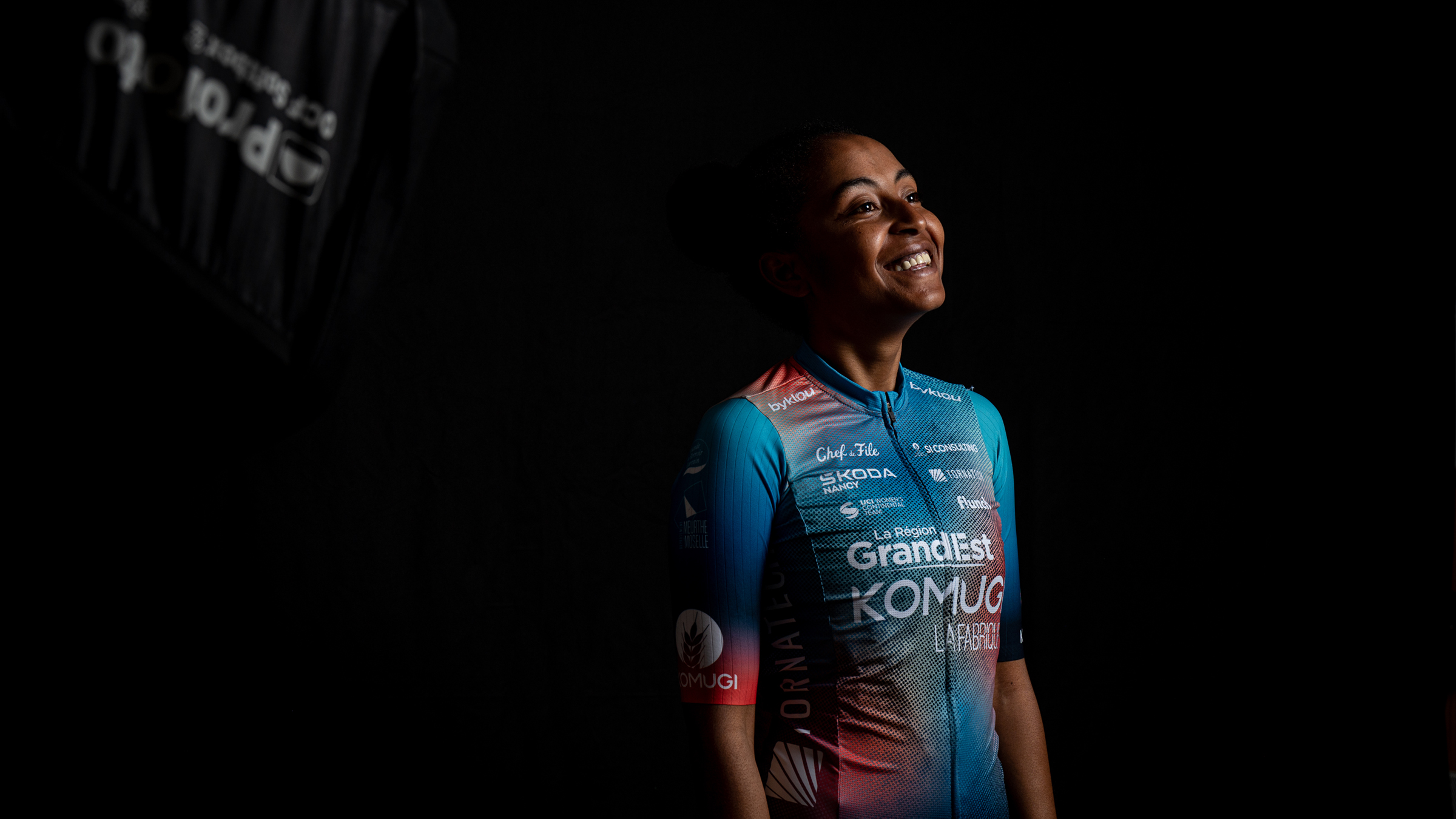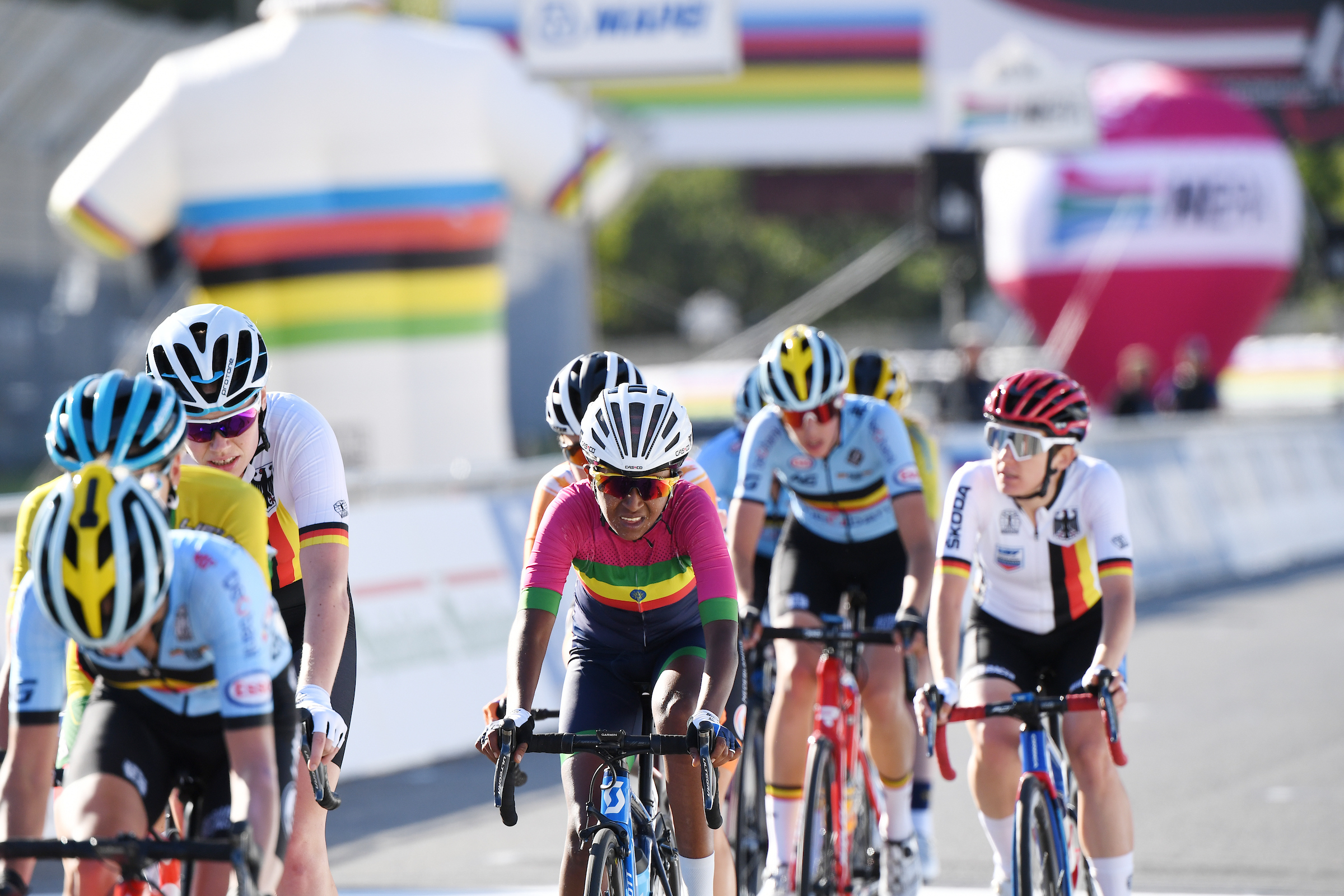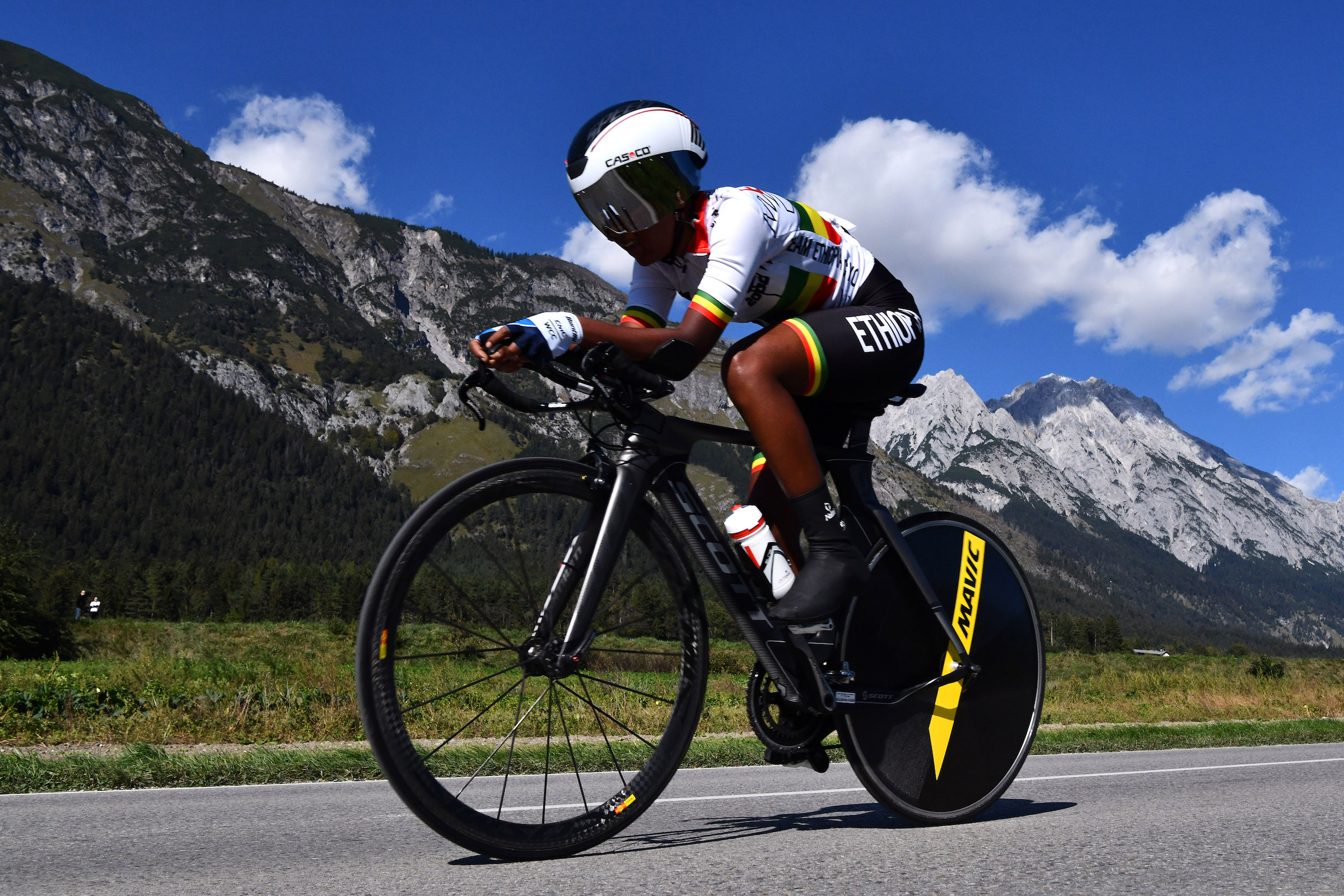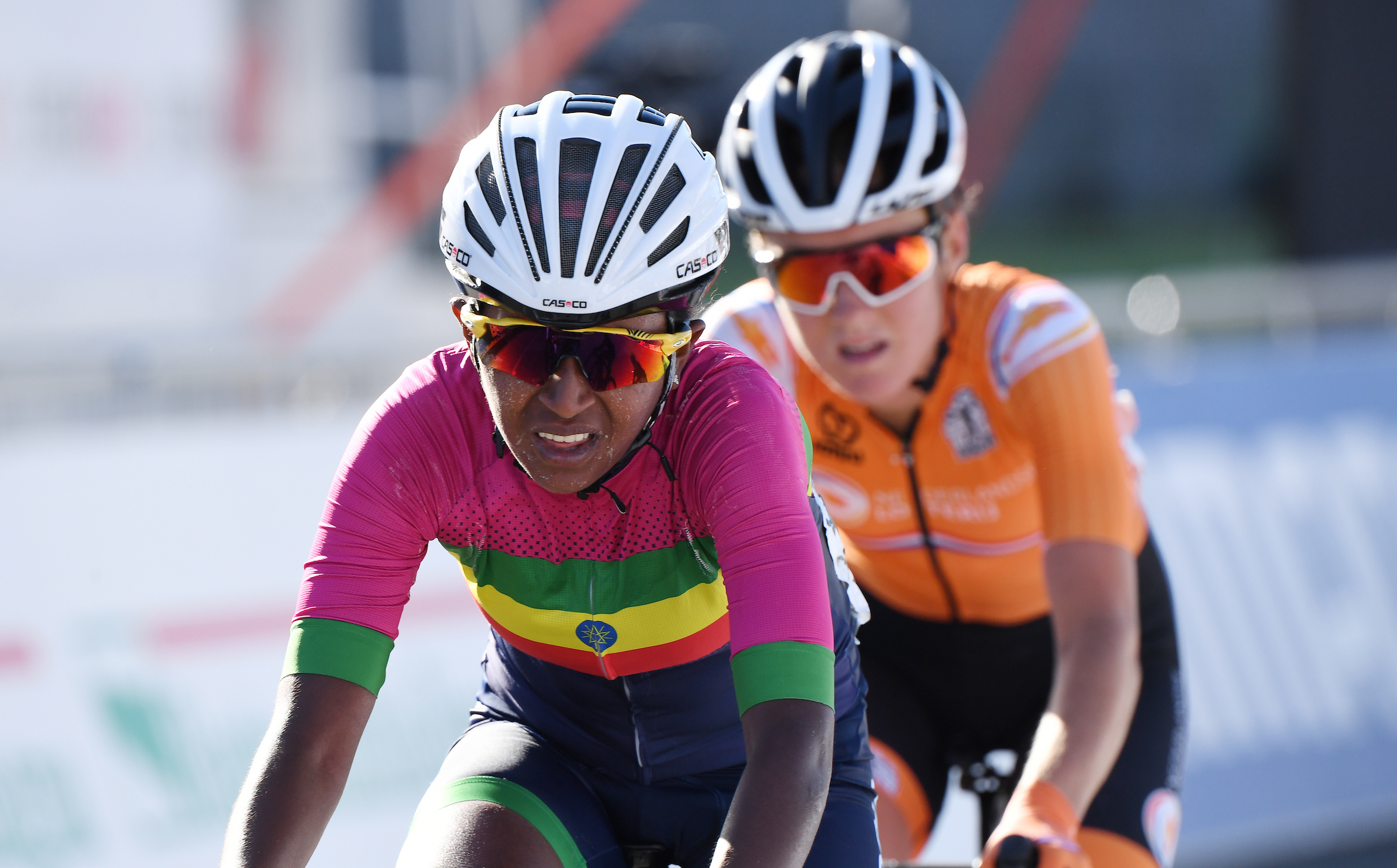'Cycling saved my life' - Eyeru Tesfoam Gebru on facing civil war and a message of hope through pro racing as a refugee
Selected for Ethiopia, Eyeru Tesfoam Gebru went missing at the Flanders World Championships before seeking asylum and a new beginning in bike racing


Being picked for a World Championships can be the accomplishment of a lifelong dream for athletes from smaller and less-resourced countries. For Eyeru Tesfoam Gebru, selection for the 2021 Worlds was life-changing, a sliding doors moment that has altered the trajectory of her entire life.
Ethiopia, her nation, was in the grip of a brutal civil war: the federal government, backed by Eritrea, was at conflict with the Tigray region, the country’s cycling heartland. Gebru, a proud Tigrayan, had lived through nine months of hell. Family and friends had died at the hands of their own government; their culture, their way of living, and their future was being oppressed through horrific acts of genocide.
Gebru wanted - needed - to escape. She had a route out: her bike, more specifically, by being selected to represent Ethiopia at the World Championships in Belgium. It was her only chance.
She arrived in France in August 2021, just over a month out from what was going to be her fourth appearance at the World Championships. But despite being on the provisional startlist for both the time trial and road race, Gebru, 23 at the time, wasn’t in Flanders when the racing began; she instead went missing. To where, she will not reveal.
“I didn’t want to represent my country because it would have been supporting the genocide of my people,” she says firmly.
Over the following four months, Gebru lived a nightmare, hellish memories she does not want to revisit in detail. “I don’t want to talk about everything. It was really hard. Horrible.”
Get The Leadout Newsletter
The latest race content, interviews, features, reviews and expert buying guides, direct to your inbox!
Four months later, she turned up in Nice, France, and several months later, eventually resumed her cycling career. This is her astonishing, desperately sad journey from being trapped in a war zone to being an asylum seeker racing some of cycling’s biggest races.
Chasing dreams

Tigray, a region of more than five million people pre-war, is pressed up in the northwest corner of Ethiopia, surrounded by Sudan to the west and Eritrea to the north. It’s a semi-arid land of mountains, high plateaus and roasting hot summer temperatures.
It has, largely owing to the wider region’s previous Italian colonisation, been Africa’s cycling hotspot for decades. Gebru was born and grew up in the historic city of Aksum, 150km northwest of the region’s capital, Mek’ele. She was an only child and lived with her mother (Gerbu has requested not to reveal her mother's name).
Until her mid-teenage years, cycling wasn’t in her orbit. But then that changed. “Every Sunday, they raced in the street, and I heard about Hadnet Asmelash, the wife of Tsgabu Grmay [a pro since 2012 and currently racing for Jayco-AlUla]. I wanted to be like her,” she remembers. “It wasn’t easy to get a bike as they were very expensive. It was always in my imagination, though.
“When I was 16, I started making money helping my mum, and on a Saturday, I’d sell oranges, lemons and other local fruits. I would buy from the farm for cheap and then sell them for more money in the city. My mum also made homemade snacks called kolo - a combination of roasted grains - and I’d sell these too. With this money, I could rent a bike on Sundays for 10 or 20 minutes. This is how I learned to ride a bike and how I practised.” Proficient after six months, Gebru joined a local club, Ketema Axum Cycling Club. “It was at this moment that I started to chase my dream,” she smiles.

Soon after, Messebo Sement Factory Cycling Club in Mek’ele then began a women’s team and selected Gebru. She made the move to the bigger city - following a well-trodden path of other aspirational Tigrayan cyclists - and was selected for the 2015 African Championships. Second in both the time trial and road race national championships in 2016 was a further indicator of her talent, and she was invited to train at the UCI World Cycling Centre (WCC) in Aigle, Switzerland.
Upon arriving, she was a proverbial fish out of water. “It was a real shock because in my country, we race with 20 women, and the length of the race is 50km, maybe 80km sometimes, but then I came to Europe, and my first race had days of 130km. It was the hardest race I’d ever done.” It was the 2017 Tour Cycliste Féminin International de l’Ardèche. “It was seven days, a lot of climbing, hot, raining, really difficult. I was like, ‘Why do I cycle!’”
There were issues off the bike, too. “Socialising was really hard,” she confesses. “I didn’t speak good English then, and most of the other girls spoke Spanish and other languages. After dinner, everyone went to their room; in my country, we are always together.”
Gebru had to forgo further education to pursue her cycling ambition - “my family was angry as they said if I wanted to have a good life I needed to go to university,” she says - but soon began to make progress.
Between 2018 and 2020, riding for the WCC team, she raced frequently across Europe. “Every year, I was improving, and in 2020 I sent my résumé to pro teams. Movistar said no because of COVID, and they were full, but that they’d consider me for 2022. Another big team said something similar. I was getting stronger, going well, getting the opportunity. And then suddenly the situation changed.”
Feeling Ethiopia’s war-torn Tigray

Gebru returned to Ethiopia in mid-October 2020. Two weeks later, the war started. “It was horrible. I don’t want to remember,” she says. She was in Mek’ele. “It was really hard to live in one place as all day there were air strikes and drones over civilians. You needed to hide yourself, to change your position all the time. Everything was closed. I couldn’t go to my mum’s place because the war was intense, and I haven’t seen her since.” Tears form, and she starts to cry. She takes a minute. “I lost some of my friends and family; some were cyclists. Some went to the army because they had to fight for their life. I don’t have good memories.”
Other cyclists were also trapped. Mulu Hailemichael, who now races for Caja Rural - Seguros RGA, fled on foot from Mek’ele to the neighbouring province of Amhara after two months of fighting before arriving back in Europe. Eyeru was there another six months, hoping one day she’d get her chance to leave.
In the summer of 2021, a route was opened up between Mek’ele and Addis Ababa, the country’s capital. “The federal government controlled Mek’ele, and at this moment, I left. I was the last one to leave the airport. After that, my region gained control of the city and the airport was closed. I was lucky.” The war intensified once more.
In Addis Ababa, Gebru was still not safe. “They were arresting, torturing and forcing people from Tigray, especially athletes, to go into the army,” she says. Gebru had one goal: to escape the country. She spoke with the Ethiopian Cycling Federation and requested to be entered in the World Championships, even though she hadn’t ridden her bike for almost a year. “But they knew I was from Tigray and didn’t want to help me,” she sighs. “When you ask for a visa for another country, the federation needs to help you to prove that you are an athlete by writing a letter. They didn’t want to help me because of my identity. But I didn’t give up, and after two really hard months, they said they could help me and I could go to the World Championships.”

Landing in France in August 2021, Gebru was surrounded by friends from the cycling world. The federation then told her to go to Belgium for the Worlds, and they had arranged accommodation. But Gebru was uncomfortable.
“They knew the address [in France] of where I was, and I was supposed to join them in Belgium for the race. I was so scared. I didn’t want to represent my country, but I didn’t want to say it in front of them. I was alone, and they were big in numbers. They knew I didn’t want to race, I changed contract numbers and went to a different country. Then the horrible things started for me again.”
Gebru does not disclose what happened next except to say that “it was really hard to get protection. The country where I was, they asked me everything.” Her most likely route to being granted asylum seeker status, under the act of fleeing war and persecution, was to return to France. “The first six months were difficult. I couldn’t do anything as I didn’t have the right to move from one place to the other. The place where I was was horrible. Then the French government gave me protection, and my life started from zero.”
Now in Nice, Gebru was given a room in an apartment, and the association that helped her bought a bike. “They knew about my history, and everyone I met, I was always telling them about cycling,” she says. “It wasn’t a good bike, but it was OK for training, and I could see Nice, go into the mountains. For two hours, I could try to forget the things that had happened in the past year.” Slowly, a return to racing began to materialise. “I thought I was just dreaming at first, but I was positive and thought that I could do some racing again.”
Inspiring girls in Africa

Last August, Lucas Leblond of the Grand-Est Komugi La Fabrique team contacted her and offered her a place in their 2023 squad. “He knew me from when I was racing before, knew I was strong, and gave me this opportunity. They knew everything that happened to me and believed in me. I was so grateful. It was incredible.”
Gebru moved to north-eastern France, not so far from Nancy, and into the team’s house. This season, she has raced 28 days across UCI and domestic races. A climber - “the mountains are my strength” - her best result is second on a stage of the Loire Ladies Tour in April. “I got a scholarship from the IOC Refugees Olympic team to go to the Paris Olympics [in 2024] and race for the UCI Refugee Team. It’s now my big motivation. I want to not just participate but to do a really good race.”
Since November 2022, a second peace agreement has held out, and the war has ended; the first ceasefire lasted from March to August 2022, but hostilities returned for three months. The final death tally is estimated at 600,000, comfortably making it the bloodiest war this century. “Since December, the internet and telephone lines have started working again, and once a week, I speak with my mother,” Gebru says. “It’s still limited, but it’s better than last year.”

Unlike Hailemichael or fellow Tigrayan, Q.365’s Negasi Haylu, Gebru cannot return to see her mother. “I have refugee status now, and I cannot go back home. But I am in Europe under protection and can move to places I want for racing. My mum has the right to come and visit me, but it won’t be easy. I hope I will see her soon.”
“Cycling…” she says, looking around the room. “I don’t have enough words to express what it means to me. I want to ride my bike all of my life. I want to win the biggest races, to inspire other African girls. No matter what happened to me, the strength of the passion I had for cycling gave me the strength to pass through all of those bad moments. Hearing bad news from my country was hard, but the sport of cycling saved my life.”
Subscribe to Cyclingnews for unlimited access to our coverage of women's cycling.